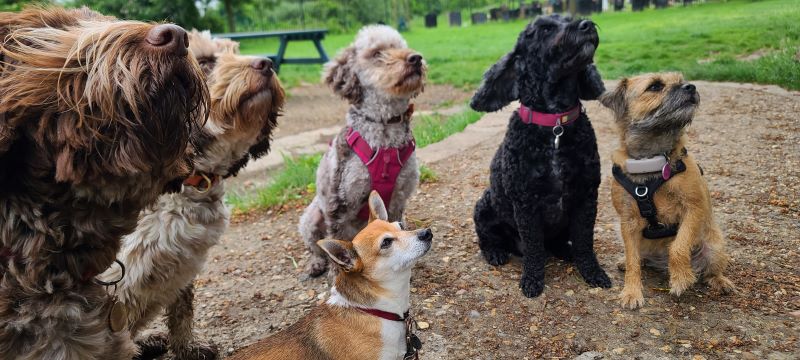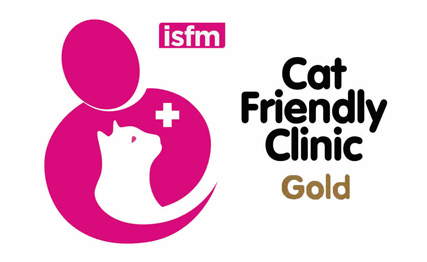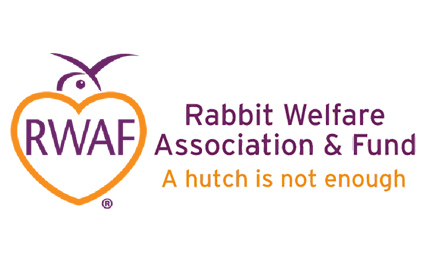24 hour contact: 020 7387 8134
Kennel cough
What is kennel cough?

Kennel cough is the common name given to canine infectious tracheobronchitis – a respiratory infection common in dogs. It got it’s name as it spreads easily between dogs and is often a problem in boarding and rescue kennels where dogs share air space.
Just like human respiratory infections, a number of different bacteria and viruses can cause this disease. The main symptom is a cough.
Where do dogs catch kennel cough?
Dogs can catch this infection anywhere that they are close to other dogs – we are most likely to see it passed on
- at ‘doggy daycare’
- groomers
- any place where dogs sniff and greet multiple other dogs
How do dogs catch “kennel cough”?
Kennel cough is airborne and highly contagious and it can spread quickly. It can be transmitted via
- shared objects such as food bowls or water bowls or toys
- poor ventilation
- cold temperatures and exposure to dust
Can any dog catch kennel cough?
Yes – no breed is immune to it.
What does kennel cough sound like?
The most obvious symptom is a forceful, hacking cough. It often sounds like your dog has something stuck in their throat. Sometimes the cough can be followed by a gag, swallowing or the production of mucus.
Are there other symptoms of kennel cough besides the cough itself?
Many dogs with kennel cough will appear healthy apart from coughing. Some dogs will have a runny nose, sneezing or eye discharge.
Is kennel cough dangerous or life-threatening?
Although it is unpleasant for dogs to have kennel cough, it is not usually life-threatening. The condition can be more serious and develop into pneumonia in vulnerable patients such as
- puppies
- elderly dogs
- unwell or stressed dogs
- brachycephalic breeds (flat-nosed dogs like English/French Bulldogs; pugs)
- dogs who have had sustained cigarette smoke exposure
Depending on the germs which have caused the virus, some strains of the infection can be more severe than others.
Signs kennel cough has become more serious
- loss of appetite
- lethargy
- increased breathing effort
Kennel cough has an incubation period of two to 14 days, and some dogs can carry the infection without developing symptoms.
Can I vaccinate my dog against kennel cough?
Yes you can. Some of the viral infections that can cause kennel cough are included in the basic vaccinations dogs need to have as a puppy, and subsequent boosters. A separate kennel cough vaccine can be given which contains the most common bacteria involved in kennel cough (Bordetella Bronchiseptica).
Call us on 020 7387 8134
How much does a kennel cough vaccination cost?
The price of the vaccination will depend upon whether it is being administered with other vaccinations or on its own. Our Pet Health Plan includes kennel cough vaccinations. For our latest price list visit :
How is kennel cough diagnosed?
There is no single test to diagnose kennel cough.
if your dog has symptoms and has been mixing with other dogs within the incubation period, a kennel cough diagnosis is likely.
Swabs may be used to determine the exact virus or bacteria – although this is not always useful for treatment. If there are suspected complications, radiographs can be used to assess a dog’s condition. Please phone your vet for advice if your dog is not eating, is lethargic, breathing heavily or you are worried in any way.. Advise staff that your dog has been coughing – as we may recommend that they wait somewhere other than the waiting room.
Can kennel cough be treated?
In most cases, dogs will recover from kennel cough without treatment within three weeks. It can linger for anything up to six weeks. To assist recovery, ensure your home is well ventilated. Avoid using a collar and lead as any pulling might aggravate the dog’s windpipe further. (Using a harness is better) Antibiotics can kill the Bordetella bacteria – the most common present in kennel cough cases. Cough suppressants and anti-inflammatories may also be given by your vet. These can reduce symptoms such as persistent coughing.
Your dog should not mix with other dogs until the cough has stopped.
Can my dog be infected more than once?
Yes. There are many different strains of kennel cough so your dog can catch the infection multiple times. If your dog has contracted the Bordetella bronchiseptica strain, he or she will typically be immune to reinfection for six to 12 months.
How is the kennel cough vaccination administered?
It is usually given as drops up the nostril. As there are many strains of the infection, vaccination cannot guarantee protection – but it makes infection much less likely and any symptoms should be milder. Vaccination is not useful in dogs already incubating kennel cough. Kennel cough vaccination is usually given at the same time as the usual puppy and booster vaccinations but it can be given on its own if necessary.
How long does the kennel cough vaccine take to become effective?
It takes four days for it to become effective and is considered the fastest method of providing immunity.
How long does a kennel cough vaccine last?
The kennel cough vaccination is designed to last about 12 months.
Can people catch kennel cough?
It is unlikely but possible that people with a weakened immune system could catch kennel cough from dogs with the disease and from dogs that have had a recent vaccination. Your medical team should advise you if you are vulnerable to infections in this way. Please let your vet know.



